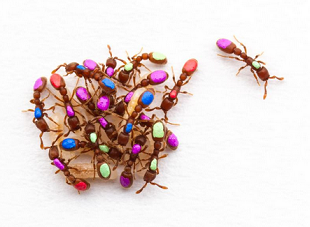 Painted members of a colony of clonal raider ants (Cerapachys biroi) nursing broodROCKEFELLER UNIVERSITY, DANIEL KRONAUER
Painted members of a colony of clonal raider ants (Cerapachys biroi) nursing broodROCKEFELLER UNIVERSITY, DANIEL KRONAUER
The commonly held view that differences in DNA methylation can determine whether a social insect becomes an egg-laying queen or a nest-tending worker has come under fire from researchers in Switzerland and the U.S. this week. According to a study published yesterday (January 21) in Current Biology, the proposed role for methylation is not sufficiently supported by existing data.
“Discovering that there is no evidence to support methylation as a reason why two ants can behave so differently was, on the one hand, a little sobering,” said study coauthor Daniel Kronauer of Rockefeller University in a press release. “On the other hand, this finding could be really important for those who want to understand the evolution of social behavior and the function of DNA methylation ...




















